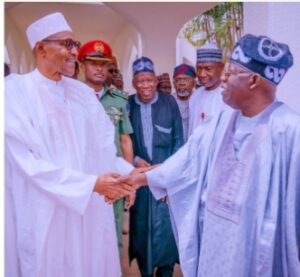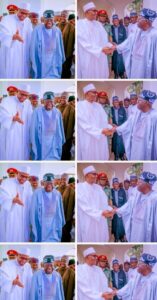Tinubu’s “Buharization” of NNPC: A New Era of Ethnocentrism? – Farooq A. Kperogi
Tinubu’s “Buharization” of NNPC: A New Era of Ethnocentrism? – Farooq A. Kperogi
By Farooq A. Kperogi
After facing years of relentless criticism from northern Nigerians for calling out what I described as the “blatantly Arewacentric nature of Buhari’s appointments” in a February 2019 column, I made a promise: if a southern president followed in Buhari’s footsteps, I would turn a blind eye.


But, as often happens, promises made in the heat of frustration sometimes falter when faced with the weight of principle.
This column was prompted by a conversation with a well-respected Yoruba supporter of President Bola Ahmed Tinubu. He expressed discomfort — even embarrassment — over what he sees as Tinubu’s increasingly Yorubacentric control of the Nigerian National Petroleum Corporation (NNPC). His concerns went beyond party politics and reflected a deeper worry about how such favoritism could erode national unity and encourage divisiveness.
I have always said that I was personally ashamed of Buhari’s narrow, regionalist approach, and I believe every progressive northerner should feel the same. It’s akin to the awkwardness one feels when a close friend comes over for dinner and your mother serves you a larger portion of food and the best cuts of meat. You might want to shout, “Mom, I know you love me, but this is embarrassing!” That was the discomfort I felt with Buhari’s apparent disregard for national balance in his appointments.
The Yoruba friend who raised this issue about Tinubu’s actions feels similarly embarrassed by what he perceives as an ethnic takeover of the NNPC. Tinubu seems to be replicating Buhari’s regional favoritism, but in the economic sector. Key financial institutions, including the Ministry of Finance and the Central Bank, are now led by Yoruba appointees, marking a level of ethnic dominance over critical national sectors that Nigeria has likely never seen before.
Should Tinubu appoint another Yoruba individual to lead the NNPC, it would be seen by many as the final piece in what is already perceived as the ethnic monopolization of Nigeria’s economic power. This would not only reinforce the image of Tinubu as an ethnocentric leader but also deepen public discontent and worsen the already fractured national unity.
If Tinubu is unaware of the growing perception of his leadership, he should take heed. Leadership isn’t just about policies and decisions; it’s also about managing public perception and fostering a sense of national cohesion. Confidence in the collective identity of the nation is equally important as concrete actions.
I’ve written before, in a 2015 column titled “Buhari is Losing the Symbolic War,” about the importance of symbolism in governance. I pointed out that while appointments don’t always directly impact the daily lives of the appointed individuals’ communities, they do carry symbolic weight. For many Nigerians, seeing someone from their region in a key position fosters a sense of inclusion and connection to the larger political system, even if the tangible benefits are minimal.
This cycle of ethnocentric favoritism must end if Nigeria is to realize its true potential. Our country’s future depends on leadership that transcends regional or ethnic interests. We need leaders who embrace inclusion and diversity, not as mere slogans but as core principles of governance. Only then can we start to heal the deep divisions within the country and build a nation that serves all of its citizens, no matter their ethnicity or region.
TRENDING SONGS
 Ahmad Yerima: Naval Officer to Face No Sanctions After Clash with Wike – Matawalle
Ahmad Yerima: Naval Officer to Face No Sanctions After Clash with Wike – Matawalle
 Trending Video: Muslim Man Joins Wife in Hallelujah Challenge ‘Dress Like Your Miracle’ Night
Trending Video: Muslim Man Joins Wife in Hallelujah Challenge ‘Dress Like Your Miracle’ Night
 Woman Seeks Advice as Late Brother’s Wife Refuses to Mourn Him Following His Death With Alleged Mistress
Woman Seeks Advice as Late Brother’s Wife Refuses to Mourn Him Following His Death With Alleged Mistress
 Nobody Cares About Fine Girls In The UK, I Miss Nigeria — Nigerian Lady Laments
Nobody Cares About Fine Girls In The UK, I Miss Nigeria — Nigerian Lady Laments
 Wedding Called Off: How Lady Cancels Wedding After Finding Out Finance’s Affairs With Her Bestie
Wedding Called Off: How Lady Cancels Wedding After Finding Out Finance’s Affairs With Her Bestie
 Heartbreak in Ikeja: Lady Weeps After Fufu Found in New Phone Package
Heartbreak in Ikeja: Lady Weeps After Fufu Found in New Phone Package
 Twist of Fate: Man Who Questioned Phyna’s ₦1Billion Demand Mourns Brother in Dangote Truck Crash
Twist of Fate: Man Who Questioned Phyna’s ₦1Billion Demand Mourns Brother in Dangote Truck Crash
 Tragedy in Enugu: Dangote Truck Claims Lives of Family of Five
Tragedy in Enugu: Dangote Truck Claims Lives of Family of Five
 Bangkok Crackdown: Nigerian-Thai Couple in Police Net Over Drug Trafficking
Bangkok Crackdown: Nigerian-Thai Couple in Police Net Over Drug Trafficking
 Family Rift: Reno Omokri’s Ex-Wife Says He Deserted Their Special Needs Son
Family Rift: Reno Omokri’s Ex-Wife Says He Deserted Their Special Needs Son
Share this post with your friends on ![]()













